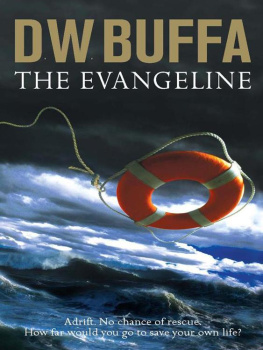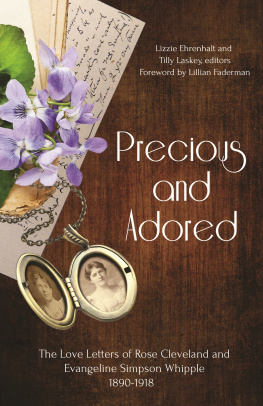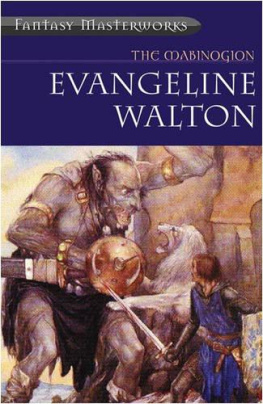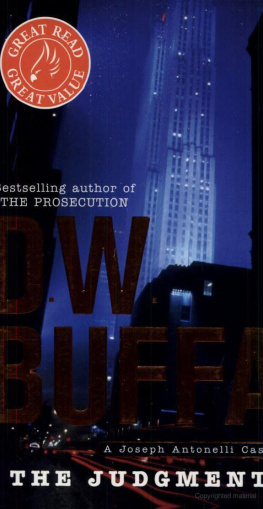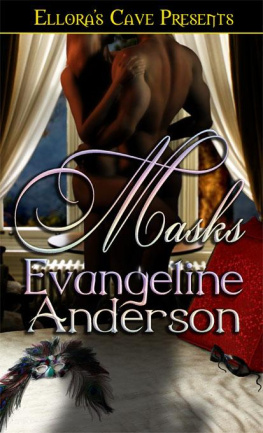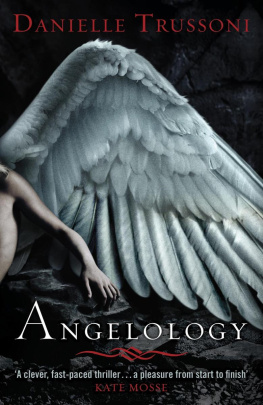D. W. Buffa - The Evangeline
Here you can read online D. W. Buffa - The Evangeline full text of the book (entire story) in english for free. Download pdf and epub, get meaning, cover and reviews about this ebook. year: 2007, publisher: Allen & Unwin, genre: Detective and thriller. Description of the work, (preface) as well as reviews are available. Best literature library LitArk.com created for fans of good reading and offers a wide selection of genres:
Romance novel
Science fiction
Adventure
Detective
Science
History
Home and family
Prose
Art
Politics
Computer
Non-fiction
Religion
Business
Children
Humor
Choose a favorite category and find really read worthwhile books. Enjoy immersion in the world of imagination, feel the emotions of the characters or learn something new for yourself, make an fascinating discovery.
- Book:The Evangeline
- Author:
- Publisher:Allen & Unwin
- Genre:
- Year:2007
- Rating:4 / 5
- Favourites:Add to favourites
- Your mark:
- 80
- 1
- 2
- 3
- 4
- 5
The Evangeline: summary, description and annotation
We offer to read an annotation, description, summary or preface (depends on what the author of the book "The Evangeline" wrote himself). If you haven't found the necessary information about the book — write in the comments, we will try to find it.
The Evangeline — read online for free the complete book (whole text) full work
Below is the text of the book, divided by pages. System saving the place of the last page read, allows you to conveniently read the book "The Evangeline" online for free, without having to search again every time where you left off. Put a bookmark, and you can go to the page where you finished reading at any time.
Font size:
Interval:
Bookmark:
Contents
To Michael Naumann
who gave me my start as a writer
N O ONE SPOKE, NO ONE MOVED, THE ONLY sound a muffled cough that made the silence more profound. In the crowded solitude of the courtroom everyone waited, as much worried about what this trial might tell about themselves as about the man who was charged with the crime. Their solemn, troubled looks told you that, deep down, they wondered whether they might not have done the same thingand whether it was really a crime at all.
At the far left, opposite the jury box, a wooden door flew open. Grey eyes blazing, the Honourable Homer Maitland moved quickly to the bench. He cast a long, thoughtful glance at the crowd and then, with a slight nod towards the clerk waiting obediently below, instructed her to bring in the jury.
Judge Maitland greeted the six men and six women with a stern formality. It seemed to serve notice, as if any notice were needed, that this was not an ordinary trial, not the kind heard dozens of times each month. This was something different, something that none of those involved in were ever likely to forget. He turned away from the jury. The narrow creases at the edge of his mouth spread along his jaw as he studied the two lawyers at the tables set side by side at right angles to the jury box.
Mr Roberts, he said in a voice as rough and weathered as his hands.
Your Honour? replied Michael Roberts for the prosecution.
Call your first witness.
It was there for just a second, a brief confession of reluctance, and something more than that: a doubt whether any of this was wise. But Roberts was not there to show doubt or hesitation; he was there to construct a case which, when he was finished, would leave no room for doubt that a crime had been committed and that the defendantand no one elsewas guilty of it.
The People call Benjamin Whitfield.
Everyone turned to look. They had never met him, but they all knew who he was. Even before what had happened, everyone had known his name.
Whitfield took the oath in a voice that, though steady, seemed to lack conviction.
Would you please state your name for the record, Roberts began as he took a position at the side of the counsel table, only a few feet from the jury box.
Benjamin Whitfield, replied the witness.
Roberts struck a languid pose, his arms crossed in front of him, one foot crossed over the other.
You are the registered owner of a sailing vessel, the Evangeline?
Yes, I am. Or, rather, I was.
Of course. Would you describe that vessel for us, Mr Whitfield?
She was a double-masted sailing ship, the finest of her kind.
And it was registered in the United States?
Yes.
Did you purchase it new?
I had her built. She was finished a year ago. She was in trial runs for several months. This was to have been her first real voyage.
Roberts moved across the front of the courtroom to the clerks desk. Would you be kind enough to identify these photographs?
He handed the witness a large folder.Whitfield removed half a dozen photographs, examined each in turn and passed them back.
Theyre photographs of the Evangeline. Two of them were taken the day she was christened; three of them while she was undergoing her first sea trials.
Stepping away so everyone could see, Roberts held up the sixth and final photograph.
And this photograph, Mr Whitfield? When was this one taken?
With a grim expression, Whitfield stared down at his hands. The day she left.
Roberts stood next to the railing in front of the jury box, waiting until Whitfield looked back.
The day she left Nice, Whitfield explained in a distant, hollow voice. The day she started her last voyage.
The day the Evangeline left the south of France to sail out of the Mediterranean, past Gibraltar, down along the west coast of Africa, around the Cape, back up the eastern coast and through the Suez?
Yes, that was the voyage she was on, to sail around Africa. It was meant to be a vacation, a way to get away from everything and just spend time with friends.
And how many of your friends were on board the day the Evangeline left the harbour in Nice?
Nineteen.
Was it your plan to sail the boat yourself?
Whitfield shook his head emphatically.No. I could have done it; not by myself, you understand, but with a crew. But I wanted this to be a time when I didnt have to do anything, when I had no responsibilities at all. Thats why I hired Vincent Marlowe; so that everything would be taken care of, so that the boat and everyone on her would be in good hands. Whitfield bent forward and stared at Roberts. I still believe that.
You still believe?
That Vincent Marlowe was the best choice I could have made. I would trust him with Whitfield suddenly stiffened; a shudder passed through him.
You would trust him with what, Mr Whitfield? Your life? You trusted him with a lot more than that! You trusted him with nineteen of your closest friends and the other seven members of the crew, said Roberts in a voice that, as it fell lower, became harsh and implacable.Twenty-seven human beings, Mr Whitfieldand how many of them are left?
Objection, your Honour, cried William Darnell, lifting himself halfway out of his chair.
It was unmistakable, that voice. It came clothed in the indefatigable cheerfulness of a man who had lived long enough to know that every day might be his last, and who found in that otherwise depressing fact one more reason to love each day he was alive.
If I still have any memory left, I could swear I heard the prosecution call Mr Whitfield as a witness. Im pretty sure I didnt call him.Which leaves meand perhaps the court as wella little confused about why my good friend Mr Roberts has decided to subject him to cross-examination?
Homer Maitland lifted one of his iron-grey eyebrows. Mr Roberts? He is your witness, isnt he?
Yes, your Honour, said Roberts without expression. Sorry, Mr Whitfield. That was unfair of me. But to get back to your testimony: you hired the defendant, Vincent Marlowe, as the captain because you wanted to spend time with your friends?
Yes. As I say, Marlowe is a very experienced sailor.
Whitfield darted a glance past Roberts to the defendant, who was sitting next to Darnell.
But something happened, and this trip, this voyage around Africa, went on without you.What happened? Why didnt you go?
Benjamin Whitfield began to rub his hands together as he leaned forward. He was looking straight at Roberts, but staring at something only he could see. Would it have made any difference if I had gone? I keep wondering what I would have donewhat anyone could have done
Roberts clutched the hard, varnished railing of the jury box with his right hand and shoved his left hand into his pocket.Why didnt you go? he asked.
The question brought Whitfield out of the strange reverie into which he had fallen. He shook his head. My father had a heart attack. I had to get home.
Im very sorry. And did your father?
The doctors could not save him. He died in the hospital a few days later.
But you were able to spend some time with him? You had the chance to say your last goodbyes. And he died surrounded by his family. He
Your Honour? objected Darnell.Were all very sorry for Mr Whitfields loss, but Im not quite certain that I see the connection between the manner of his fathers death and the charges brought against my client.
Judge Maitland gave Roberts a cautionary glance. Roberts returned a brief, formal nod and, without moving from his place next to the jury box, went on to his next question.
Mr Whitfield, there were nineteen passengers and eight crew members on board. What precautions had been taken for their safety? Lets begin with the question of life preservers, or, as I think they are sometimes called, vests?
Next pageFont size:
Interval:
Bookmark:
Similar books «The Evangeline»
Look at similar books to The Evangeline. We have selected literature similar in name and meaning in the hope of providing readers with more options to find new, interesting, not yet read works.
Discussion, reviews of the book The Evangeline and just readers' own opinions. Leave your comments, write what you think about the work, its meaning or the main characters. Specify what exactly you liked and what you didn't like, and why you think so.

